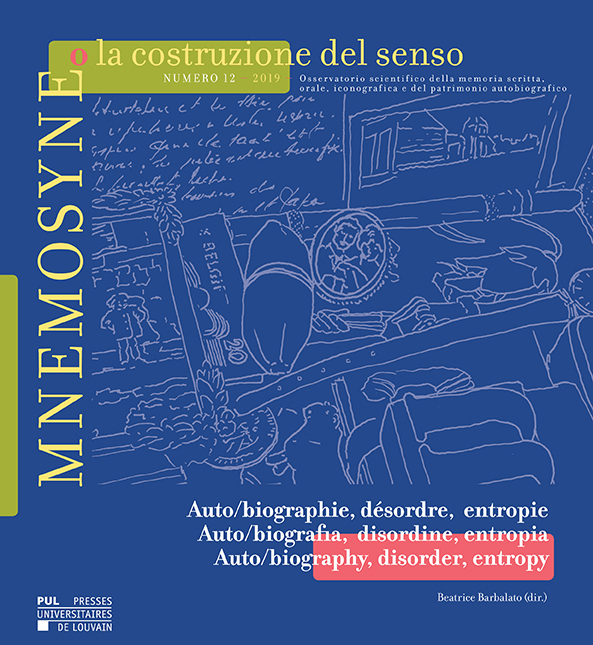No 12 (2019): Auto/biographie, désordre, entropie – Auto/biografia, disordine, entropia – Auto/biography, disorder, entropy

L’étymologie du mot entropie renvoie au grec ancien en, dedans, et tropé, transformation. Au début du XIXe siècle, un changement de focalisation intervient dans la recherche : il s’agit de tenir compte de l’incidence de l’instabilité dans toute étude relative au fonctionnement d’expressions issues tant de la physique que de la médecine, tant de la psychologie que de la littérature. Avec l’oxymore Lois du chaos (1994), Prigogine reconnaît la présence de constantes même dans des systèmes dynamiques qui se manifestent dans le désordre. Comment une autobiographie métabolise-t-elle et apprivoise-t-elle l’imprévu ? Les articles de ce numéro de Mnemosyne mettent en lumière comment des auteurs envisagent des récurrences de leur vécu tourmenté tandis que d’autres font coïncider le récit de leur existence avec les moments où les événements se produisent hic et nunc ou lorsqu’ils sont remémorés. Ces approches différentes vont bien au-delà d’une transcription de la mémoire autobiographique – entropique par antonomase –, et entendent plutôt indiquer comment en générer et en structurer le sens.
La parola entropia significa capacità intrinseca di un sistema di trasformarsi. Leggi del caos definisce con un ossimoro Prigogine (1993) il riconoscere delle costanti in sistemi dinamici senza un orientamento prevedibile. Dall’inizio del Novecento viene ad imporsi un cambiamento di focus : includere l’incidenza dell’instabilità nello studio di ogni insieme di manifestazioni. Dalla fisica alla medicina, alla psicologia, alla letteratuza cambia radicalmente l’ottica della ricerca. In che modo un’autobiografia metabolizza e addomestica l’imprevisto ? Gli articoli qui pubblicati mettono in luce come alcuni autori colgano nel proprio vissuto accidentato delle ricorrenze; altri fanno coincidere l’atto di narrare con l’hic et nunc degli eventi, col loro manifestarsi frammentario, o col momento stesso del loro emergere. Questi approcci diversi vanno ben aldilà di una trascrizione della memoria autobiografica – che è per antonomasia entropica –, essi intendono piuttosto indicare come generarne e strutturarne il senso.
The word entropy means a system’s intrinsic for transformation. Using an oxymoron, Prigogine defines The Laws of chaos as recognizing constants in dynamic systems without predictable orientation. From the beginning of the 1900s, a change of focus occurs: to include the incidence of instability when assessing every set of manifestations. From physics, through medicine, through psychology, to literature, the perspective of research changes radically. In what way does an autobiography metabolize and tame the unexpected ? The articles published here highlight how some authors identify recurrences in the bumpy ride of their existence; others make the act of narrating coincide with the here and now of events, with their fragmentary manifestation, or at the very moment of their emergence from memory. Such different approaches do not ascribe objectivity to memory, which is quintessentially entropic. By doing so, they do not mean to record the content of memory but rather to indicate how to generate and organise the meaning of memory.


